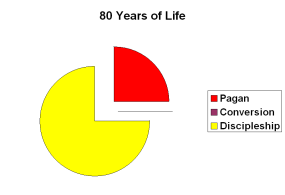Church Forward is a new blog I’ve added to my reading list. A few days ago, that site published the results of a study that showed the attitudes of the unchurched to evangelism. All the stats are important (please consider them carefully), but one stood out in particular:
78% of the unchurched agree that “if someone wanted to tell me what he or she believed about Christianity, I would be willing to listen.
That’s an astonishing figure. Part of me wonders if the survey question was understood. Honestly. Because that figure is amazingly high.
Last week I wrote about a subset of people who seem to be completely aspiritual. They may be the missing 22 percent. I suspect that they are the group that is actually growing in number.
If so, then our window of opportunity on that 78 percent is as wide open as it will ever be.
Let’s put this in perspective. In the amount of time it takes to watch an episode of Dancing with the Stars, American Idol, 24, or Lost, 6,319 people worldwide will have died {source}.
The general consensus is that about a third of the world’s population is “Christian,” a loose definition that includes not only the genuinely born again,  but also cult members who ascribe to deviant forms of Christian belief and people who may mentally assent to Christian morality. In other words, that one-third is quite generous.
but also cult members who ascribe to deviant forms of Christian belief and people who may mentally assent to Christian morality. In other words, that one-third is quite generous.
Yet even if we assume that loosedefinition, applying the basic truths of mankind’s eternal destiny, of those 6,319 people, 4,212 are doomed to an eternity of torment in the flames of hell. 4,212. Every hour. Every day.
This is not a pain that goes away. No narcotic exists to extinguish that agony once it’s administered.
Leonard Ravenhill, the great British revivalist, put it this way in a true story:
Charlie Peace was a criminal. Laws of God or man curbed him not. Finally the law caught up with him, and he was condemned to death. On the fatal morning in Armley Jail, Leeds, England, he was taken on the death-walk. Before him went the prison chaplain, routinely and sleepily reading some Bible verses. The criminal touched the preacher and asked what he was reading. “The Consolations of Religion,” was the replay. Charlie Peace was shocked at the way he professionally read about hell. Could a man be so unmoved under the very shadow of the scaffold as to lead a fellow-human there and yet, dry-eyed, read of a pit that has no bottom into which this fellow must fall? Could this preacher believe the words that there is an eternal fire that never consumes its victims, and yet slide over the phrase with a tremor? Is a man human at all who can say with no tears, “You will be eternally dying and yet never know the relief that death brings”? All this was too much for Charlie Peace. So he preached. Listen to his on-the-eve-of-hell sermon:
“Sir,” addressing the preacher, “if I believed what you and the church of God say that you believe, even if England were covered with broken glass from coast to coast, I would walk over it, if need be, on hands and knees and think it worthwhile living, just to save one soul from an eternal hell like that!
Hang around the Godblogosphere long enough and you’ll see plenty of fawning posts about the TV shows I mentioned above. Or about some lame movie. Or about some album by some derivative band. You’ll read plenty of talk about stuff that that will burn when the fire comes, but you’ll read next to nothing about what happens to the lost when that same fire comes for them.
If the American Church’s concern for the lost people of the world could be summed up in one phrase, I suspect that phrase would be “Let ’em burn!”
If we cared, we’d live differently. But we don’t really care, do we?
For most of us, the limit of our caring extends to the walls of our home and no further. A few of us may say we care about others beyond those walls, but our caring never gets around to asking another person, “Where do you stand with Jesus?”
I don’t like what our American culture has done to me. In fact, I despise it. Because when I look deep into my own soul, I see a nearly total lack of caring about the eternal state of other people. I may say I care, but I don’t care enough to make the changes needed to my life to ensure I’m living for Jesus. And living for Jesus means that I no longer live for myself.
The power of the American lie casts a spell over us, doesn’t it? That lie takes Christ off the throne and enthrones that pretender, self. It’s the lie of “God wants you happy!” instead of the truth that God wants you obedient to the Lordship of Jesus Christ.
Now we may say that we’re sold out to Christ, but we aren’t. We lie to ourselves and keep playing the happy card, that selfish, devil-filled mantra of self-fulfillment no matter at whose expense that happiness comes.
Because when we get right down to it, we’re so preoccupied with self-fulfillment that we’re willing to gamble the lives of two out of every three people to ensure it, 4,212 people each hour, so that we can keep on living for whatever pleases us, even if that pleasurable pursuit wracks the heart of God.
Can we imagine having to apologize to each person bound for hell who had the opportunity to hear the Gospel from our lips, but we were too busy caring about what Jack Bauer would do next?
Well, can we?
We should count ourselves lucky if we merit the tiniest cot in the broom closet of the mansion Christ is building in glory.

